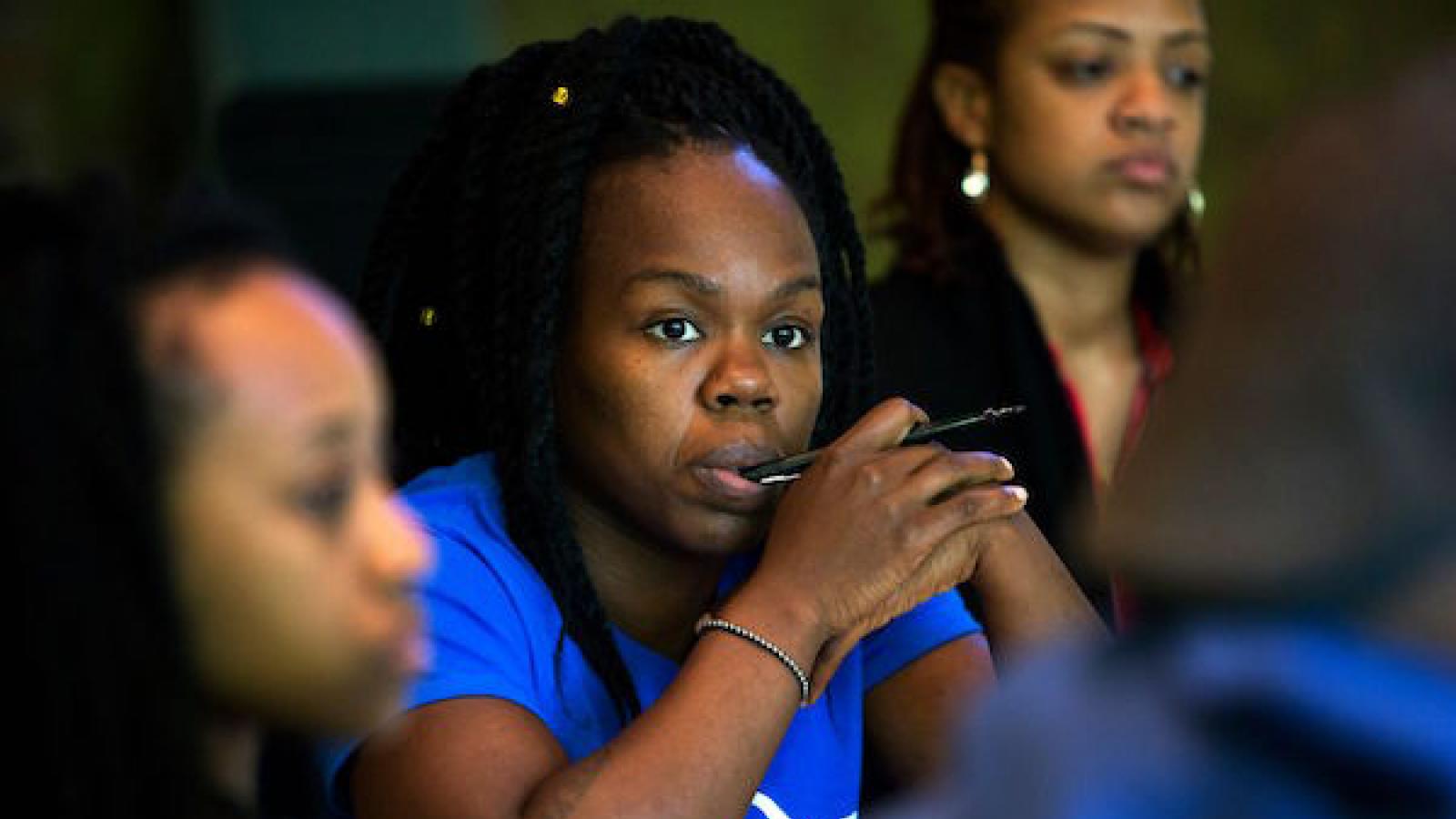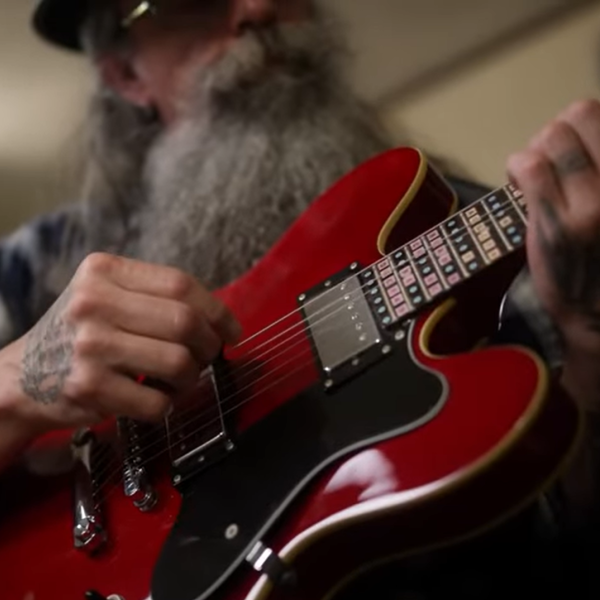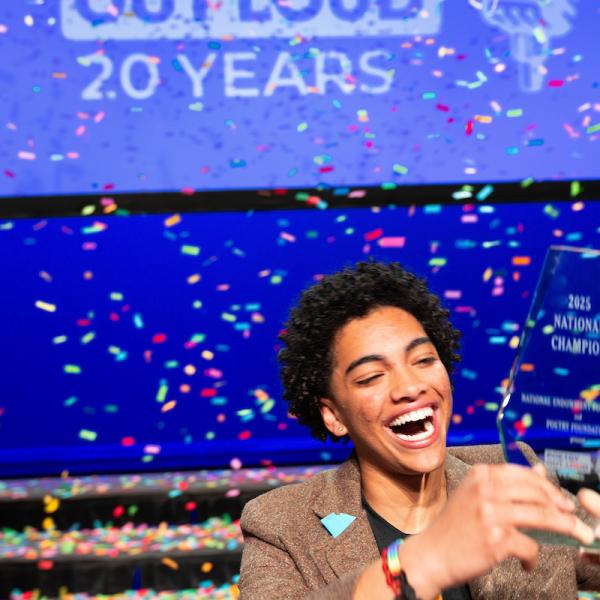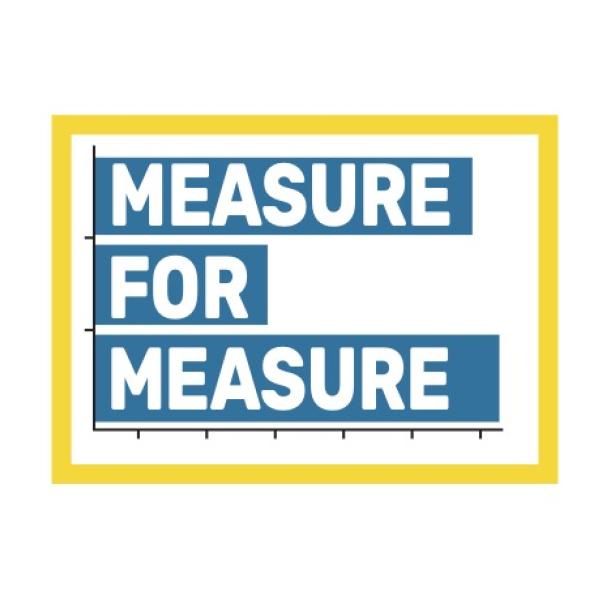Grant Spotlight on New Harmony Project

The historic town of New Harmony, Indiana, was founded in the early 19th century to be a spiritual, social, and cultural utopia in the Midwest. It’s no surprise that the New Harmony Project, which runs an annual conference for theater, television, and film writers has the same idea in mind. Founded 31 years ago, the Project, which was recommended for a FY17 NEA grant, provides support—by way of the conference, residencies, and other activities—for up to 12 writers who are interested in exploring stories that offer hope. As New Harmony Project Artistic Director Mead Hunter explained during a telephone interview, the organization’s founders “wanted to form an organization that would safeguard the writers’ desire to speak to something that would celebrate life.” Here’s more from Hunter on how exactly the Project works, the opportunities it provides for high school and college students, and why having an opportunity like this for writers matters.
NEA: What sparked the creation of the New Harmony Project?
MEAD HUNTER: It was formed by a group of people… who felt that in all these various media, there was a dearth of stories that were positive, in that they spoke to people meeting challenges and overcoming them… They wanted to form an organization that would safeguard the writers' desire to speak to something that would celebrate life rather than show negative aspects of it. They wanted to counter what they thought was the movement toward sensationalism and toward looking at negative aspects of life in the sense of people succumbing to pressures that were larger than them. They wanted to show people overcoming challenges. Given that dramatized narrative tends to be about conflict, they thought that it didn’t have to be about somebody who simply caves in under the weight of so much conflict. It could be someone who meets those challenges, overcomes them, and moves forward with their lives. So that's why they thought it was important to really encourage writers to tell these stories, and not just stick to certain tried and true formulas that existed in the storytelling world.
NEA: How does the conference work?
HUNTER: Every year we invite somewhere between six and 12 writers to come and be in residence in [the town of] New Harmony and they're there in a couple ways. We will invite some of the writers to come with a work-in-progress—ideally something that's very much a work-in-progress—and work with directors, dramaturges, actors, and other support personnel to rehearse for a couple weeks, and then put [the work] on for the general public at the end of the two weeks. That’s a very powerful process for those writers because you can do all kinds of work in isolation in front of your computer, but it takes actors actually to give voice to it, for a writer to understand, "Oh yea, it doesn't sound right," or "That's not what I meant to say," or "I'm being ambiguous about the way I presented that."
The majority of the writers [we work with] are simply, what we call 'in residence." That means they come to New Harmony not on the strength of a particular script, but because we believe in them as writers and we're going to see what will happen in New Harmony. So for those writers, they arrive and it's a little bit like a writers' colony, in the sense that they're there on retreat with many other writers, and they write whatever they do. Some people come with a script in progress that they want to work on; others come in with a rough idea, or maybe no idea, and they see what comes to the fore. [These writers] usually, while they're there, will borrow actors from the company, or maybe borrow each other, and put together a cold reading in front of the company, and then we discuss that with the company. So that way they can move their work forward even though they're not rehearsing it in the usual sense. Sometimes we'll present some of that at the end of the conference as well, but we like to safeguard that [for the writers in residence] and say you don’t have to show anything. It's not about [presenting something at] the end of the conference; it's really about the time you spend there on whatever you want to.
NEA: Can you talk about how local students also benefit from the conference?
HUNTER: There's one day where students from various high schools come in and they're embedded in the conference. They will go to two or three rehearsals in the course of the day. They'll watch the director work with the actors. The director doesn't do a special thing for the students; they do whatever they would have been doing anyway. At a certain point, the director stops the rehearsal and asks for questions from the students. In addition to that, [the students] take a lab in acting and they take a lab in writing with writers or actors who are at the conference that year. [We also do a Q+A session] with all of the writers present, and that is an opportunity for the students to ask them whatever they want to about the nature of writing for performance, what's it like to be a professional playwright or to work in Los Angeles on film or TV, anything that's on their minds they can ask those writers…. Some [of the students] are more interested in acting, some more in writing, some may have no native interest in theater and they just thought it sounded like a good time so they came along.
The other thing we do that's very exciting is that we invite exceptionally talented undergraduate students to come and work at New Harmony in various capacities. They may have jobs to do in the rehearsal room, such as literary assistant, such as stage management, things like that, or they may be working in the office, but they mostly come to us as people who are interested in performance. We often populate our readings, the younger roles, with these actors. They come largely from the University of Evansville, but other universities as well…. They come to work at the conference because they either have an interest in playwriting, or stage management, or acting. And they see what's going on, see how the professionals comport themselves in the rehearsals and out of them. For those interns, New Harmony really is their conduit into a professional life. They’re still students, but they're meeting all these professionals, they're seeing how the system works, and hopefully they're getting a sweet tooth for the creation of original work. It's great to work on the classics—Chekov, Shakespeare, Ibsen—but there's really nothing like realizing you are the very first person to ever help a writer put a work on stage or envision it for other media. No one else is going to have as big an impact as you are in that moment. I love seeing the college students catch fire with that idea, that this is a way they contribute to the field not just by being an actor, stage manager, writer, but also by participating in the birth of a specific work.
NEA: With the high school students, in particular, why do you think it's important for them to have this type of arts education experience, even if they don’t go on to have a creative arts career?
HUNTER: That's a good question. At University of Portland, I teach a large freshman class made up of lots of people like engineers and nurses. Sometimes we have the problem that they don't consider themselves creative, which is a shock. I say, "Well how are you going to be an engineer if you're not creative? Of course, you're creative!" With the high school students, it's a little bit of that same idea. They come here thinking of themselves as passive consumers, perhaps, of culture, or of storytelling media like the movies, and when they see what we do, they realize that they can actively participate and that they can be part of moving that forward. They don't have to be passive consumers.
[Visiting the conference] lowers a barrier culturally, to the point where they feel that the creation of stories belongs to them. It's not that it's up to somebody else; they can actually be part of that. Maybe they create themselves, maybe they have an impact on the work that's created, but this [experience] reflects culture as it is right at this moment in the United States of America, and they can be part of telling that story. They don't have to think of it as a cultural duty, you know, where I'm going to Shakespeare because my teacher says that it's good so I guess it must be good. They see the development of new works and realize that it's right here and now and they can empathize with what's going on. There may be many types of points of view that they see in their stories, but it's not a question of right and wrong, it's a question of everybody being right, so to speak, and entertaining the ideas in one single large context. It's really great to see the high school students realizing that is possible because they don't always know that when they first come.
NEA: What has the NEA’s funding made possible for the New Harmony Project?
HUNTER: For 30 or more years, the New Harmony project has been mostly about the conference, but in recent years, with NEA support, we began to think what else could we do besides this conference, how could we extend our footprint. So that's led to writing labs in the city of Indianapolis, where we perceived that there was a dearth of writing for performance. With the help of NEA funds, we began to offer writing labs in playwriting and also screenwriting. I'm hoping to do one in teleplay writing in the near future. These are all free to the public. We bring in a writer that we think is outstanding and that will do well with the public, and ask them to do a writing lab.
We've also been inviting writers to come and be in New Harmony on their own, outside of the conference, without the usual support, to just live in that beautiful town of New Harmony and have two or three weeks of absolute peace and quiet to use as they want to. While they're in residence there in New Harmony, they do one or two labs with the local constituency, which is awesome. The town of New Harmony is 700 people, so when you offer a lab in a rural community like that, that is strongly felt. People know that that's not an opportunity they have very often without going all the way to Indianapolis, which is four hours away by car. So this is happening right there in New Harmony, and we have been gratified that so many people have turned out in that small town to take advantage of writing opportunities. The NEA has enabled us to do all that because previously, it was all we could do just to cope with the conference itself, and these additional funds have allowed us to extend what we do to Indianapolis and also to rural southern Indiana.
NEA: Is there a recent project you can share that exemplifies the spirit of what you're trying to accomplish at New Harmony?
HUNTER: We just did a project this past May called The Homecoming Queen which is by Ngozi Anyanwu. Ngozi is Nigerian-born, and came to the United States at a very young age. So she wrote this play, Homecoming Queen, about someone who goes back to Nigeria with the idea that she’s going to get in touch with her roots and discovers that that's not as easy as it sounds. In bringing this in, we felt very strongly that this was an important play, beautifully told, a great peek at a clash of American and Nigerian culture in a humorous way, so, likely to arouse empathy. We wondered how that would play in rural, southern Indiana. Would it make sense? Would the story seem like it was merely about a particular case in a land far, far away? So we brought that in with some trepidation, had a great time during the two weeks in rehearsal, and then presented it. It was very moving to me to see the audience hanging on every word in this two-hour presentation. At the end of the presentation, this audience—at that point it was about 150 people—they leapt to their feet and applauded, which I had very, very rarely seen happen. Usually people are glad to see the show and they're very enthusiastic with their applause, but they don't leap to their feet. So I was moved to see that not only did they entertain the story, but they were moved by it to the point where they wanted to express their feeling.
NEA: In the broader culture, in the U.S. in the 21st century, why do you think the New Harmony Project is important? Why does it matter?
HUNTER: Interestingly enough, I think it's more vital now than it was 31 years ago when we founded New Harmony Project. We're at a point in our culture where, so often, people are able to curtain themselves off from hearing what others think. It's possible to silo oneself into a very regimented view of the world, but when you're hearing the story, and the story is captivating you, you know, you want to see where the story goes. You're much more likely to entertain ideas of all kinds. And hopefully out of that dialogue comes empathy for everybody on every side of that question. So, yes, I really do believe that writing for performance is more valuable now than ever.




